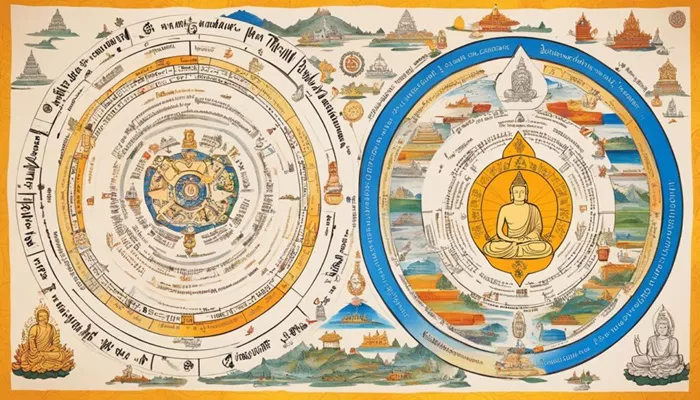Karma is one of the most important ideas in Buddhism. It means “action” or “doing,” and refers to how our actions affect our lives. In Mahayana Buddhism, karma is deeply connected to faith, daily behavior, and the path to liberation. This article explores how Mahayana Buddhism understands karma, how faith influences it, how karma works in everyday life, and how it helps us reach liberation.
What Is Mahayana Buddhism?
Mahayana Buddhism is a major branch of Buddhism. It began around the first century BCE and later spread widely across East Asia. It focuses on the idea of the Bodhisattva, a being who seeks enlightenment not only for themselves but for all sentient beings. Mahayana teaches compassion and wisdom as the two main qualities to develop on the path.
Mahayana Buddhism Meaning
The word “Mahayana” means “Great Vehicle.” It is called this because it carries many beings toward enlightenment. Mahayana Buddhism expands the teachings of early Buddhism by adding new sutras and ideas about the nature of reality and compassion.
The Concept of Karma in Mahayana Buddhism
Karma as Cause and Effect
Karma means every action has a result. Good actions lead to positive results, and bad actions lead to suffering. These results may appear in this life or future lives. This law of cause and effect is not punishment or reward by a god but natural consequences of our deeds.
Karma and Intentions
In Mahayana Buddhism, the intention behind an action is very important. Even if the result is not good, a kind and pure intention creates good karma. Likewise, actions done with selfish or harmful intentions create negative karma. This shows why mindfulness and ethical living matter.
Faith and Karma in Mahayana Buddhism
Faith in the Dharma and Karma
Faith in Mahayana Buddhism is trust and confidence in the Buddha’s teachings, especially about karma. Faith helps practitioners keep strong in their practice and understand that their actions truly shape their lives. It is not blind belief but a deep understanding that ethical actions bring positive change.
Faith and Compassion
Faith in Mahayana Buddhism also supports compassion. Believers understand that all beings suffer because of negative karma. This faith motivates them to help others and act with kindness, creating good karma for themselves and others.
Function of Karma in Daily Life
Karma Shapes Our Present Life
Karma influences our physical and mental experiences. Our present circumstances, personality, and habits are partly shaped by past karma. Understanding this helps people accept challenges and work on improving themselves.
Karma and Ethical Conduct
Mahayana Buddhism teaches the importance of ethical conduct. By following the Five Precepts and practicing compassion, people create good karma. This good karma supports a peaceful and happy life and progress on the path to enlightenment.
Overcoming Negative Karma
Mahayana Buddhism offers ways to lessen the effects of negative karma. These include repentance, making positive offerings, chanting sutras, and practicing generosity. These actions purify the mind and reduce the power of harmful karma.
Karma and Liberation in Mahayana Buddhism
The Goal of Liberation
In Mahayana, liberation means freedom from suffering and the cycle of rebirth (samsara). Karma is one of the main forces that keep beings trapped in this cycle. By understanding karma, a practitioner learns how to break free.
Transforming Karma through Wisdom and Compassion
Mahayana Buddhism teaches that liberation comes from realizing the true nature of reality—emptiness (śūnyatā)—and acting with compassion. When one understands emptiness, karma loses its binding power because actions are no longer attached to ego or fixed self.
The Bodhisattva Ideal and Karma
The Bodhisattva practices not only to free themselves but to help all beings. This great compassion transforms karma into a force for good. The Bodhisattva creates merit by helping others and uses wisdom to guide all beings toward liberation.
Conclusion
Karma in Mahayana Buddhism is not about fear or punishment. It is a gentle reminder that every thought, word, and action matters. By understanding karma, we learn how to live more mindfully, treat others with kindness, and take responsibility for our lives. Mahayana Buddhism teaches that through faith, compassion, and wisdom, we can purify negative karma and create a path toward liberation—not just for ourselves, but for all beings. Karma is not a trap. It is a tool for growth and awakening, guiding us step by step toward ultimate freedom.

